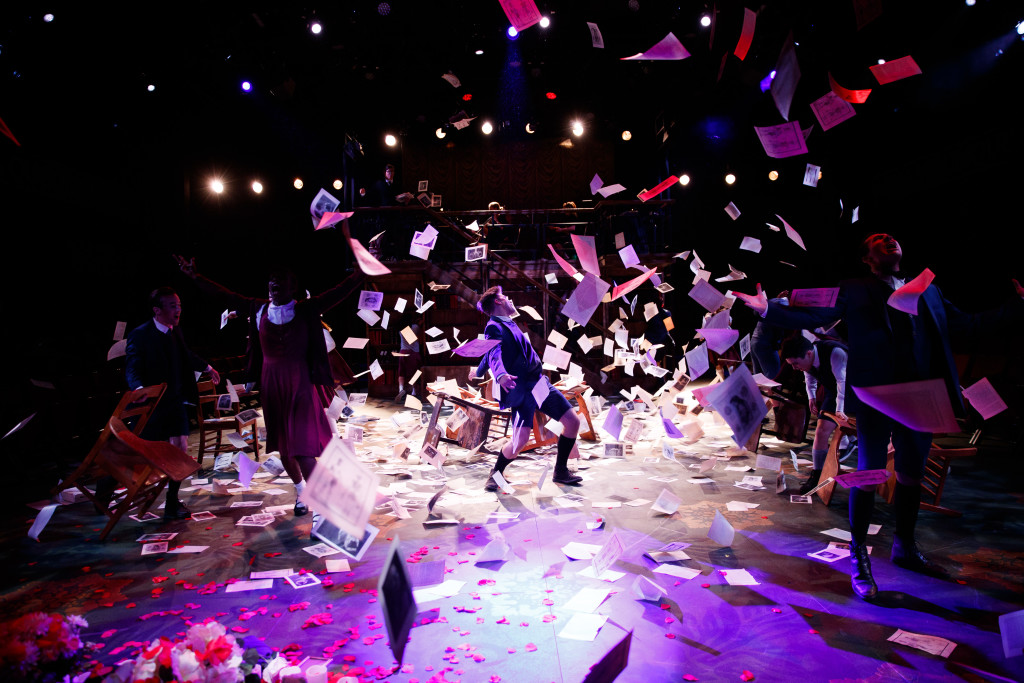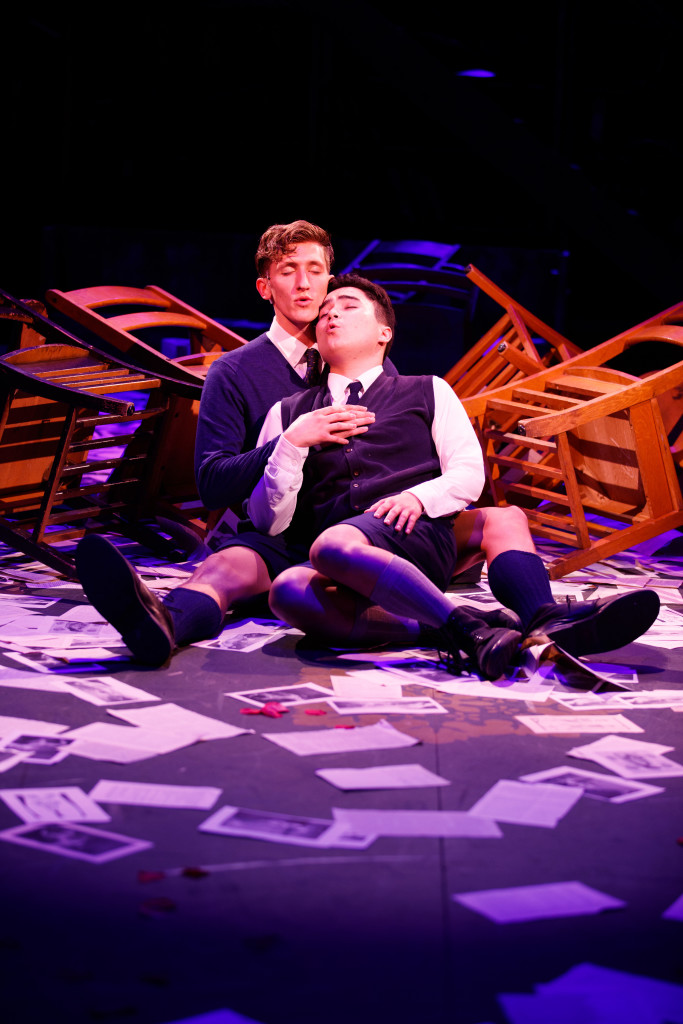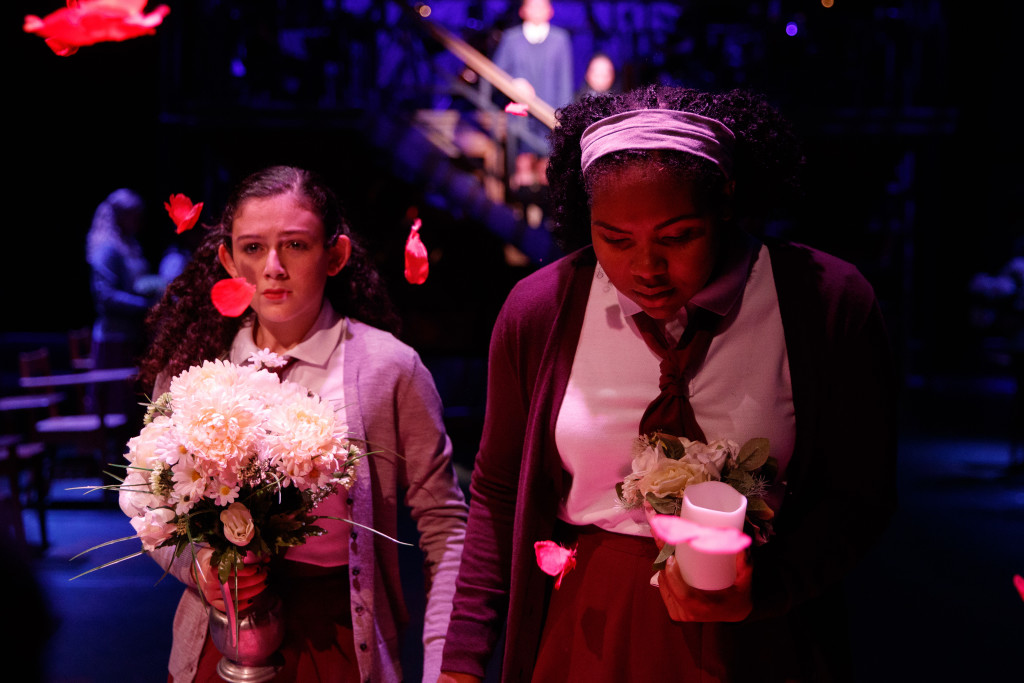
In 1891, Stanford University opened its doors to its first class of undergraduate students. Almost 6,000 miles away in Germany, Frank Wedekind completed the script of his first major play, Frülings Erwachen-Spring Awakening. 125 years later, Stanford Theater and Performance Studies brings us the musical adaptation of Wedekind’s play, and we are moved to consider all that has changed, and all that has not.
Both the original play and musical adaptation by Steven Sater and Duncan Sheik deal with sexuality, religion, authority, pressures and expectations, and suicide among a group of young teenage students in a provincial German town. Sheik’s punchy, Grammy-winning music, as well as standard production tropes like the students pulling handheld mics out of their pockets during certain anthems, are crucial in bridging the gap between the pastness of the story and the present. Much of the content speaks of a culture that seems far from our own. Sex education is limited to the stork story, boys and girls are separated in school, and education takes the form of rote, didactic memorization. The shock of seeing the budding homosexual between Hanschen and Ernst at Spring Awakening’s 1906 Berlin premiere seems like it would not carry to our liberal enclave in a country where gay marriage has been gaining legal status (now, nationwide) for years. Wendla’s reaction to her pregnancy, “I didn’t know” (that sex is how reproduction occurs), seems impossible in our culture of not only educating students on what sex is, but how to engage in it consensually.

It is up to each production of Spring Awakening to get the audience to connect to the more antiquated parts of the show. The best productions make the audience question, are these things so oldschool after all? This was one such production. Its strongest asset, especially in comparison to other productions at Stanford, was the caliber of talent across the cast. Everyone could sing, everyone could dance, and everyone could act. There was no point where I felt uncomfortable for the sake of the cast. Hanschen (Jeff Bennett, ‘17) and Ernst’s (Andrew Savage, ‘19) coming out to each other, for each scene felt real, raw, and exceptionally tense. Wendla (Saya Jenks, ‘16) and Melchior (Matt Herrero, ‘17) created equal levels of complex, believable sexual tension that causes the heart to both race and ultimately, break. For theater, this is unusual. For student theater, it is almost unheard of.
The talents of the ensemble provided energy and support for the leads, especially Jackie Emerson’s (‘17) striking portrayal of Thea. Lucie Fleming (‘17) and Graham Roth took on the roles of Adult Women and Adult Men, perhaps the most challenging roles of the show, with nuance and grace. In the children’s minds, all adults are the same. It was up to Fleming and Roth to distinguish their characters, which they did with a near professional level of character detail. From Fleming’s delivery of Fanny Gabor’s lines in “And Then There Were None” to Roth’s faintly trembling posture during Moritz’ funeral, the two made the the most distant, old-fashioned characters some of the more relatable.
These acting highlights, as well as production elements like the powerful, parallel choreography and blocking, the lighting design of “The Dark I Know Well,” and the digital display of Wendla’s grave established a crossover between the outdated and modern that created a foundation for the very relevant themes and scenarios to shine. Moritz, and his superior portrayal by James Seifert (‘17) is perhaps most characteristic of this. Moritz, in the midst of confusing sexual awakenings, fails his exams and will not be promoted in school. His parents’ disapproval and additional social pressures push him to a “so dark” place at the barrel of a gun. Red petals fell from the ceiling, in the last spot he stood alive, over his grave and memorial of framed photos, letters, and candles. It is just like the memorials to lost loved ones, especially to youth, today.

When Herr Stiefel walks Moritz backwards down the staircase, backing him into a corner of failure and disappointment, we see the students of Gunn and other neighboring schools who were backed into corners by impossible demands and expectations. When we hear Moritz mutter “all I had to do was say yes” after rejecting Ilse, we are reminded of our own fears of deviating from the path and exposing our vulnerabilities to friends and loved ones. Even when we watch the school administrators callously discuss Moritz’ suicide and the need for “some casualties,” we think of universities and institutes that diminish or hide suicides for the sake of “community safety” and reputation.
Once we see these things, we cannot unsee them. The rest of the show, (and the whole show, in reflecting on it afterwards), is filled with parallelisms to our lives now, whether we are 14, 20, or 64. This production is the best I have seen at Stanford in the past three years, partially because of its high quality of cast, staff, and musicians, but also because of its ability to be relevant. The guilt Moritz has over erotic dreams, which sounds like a remnant of a puritanical past, becomes as relatable as the shame Martha has over her abuse, which many victims of abuse share today. As Wendla says, “I just want to feel.” Each character in the show just wants to feel. These characters make us question if what we feel in response comes from explicitly parallel issues we face, like sexual assault and suicide, or from seemingly outdated issues like shame and ignorance over sexual expression?
Spring Awakening forces its audience to think about these questions. It makes us feel what is innate and raw as well as what we try our best not to feel. It makes us realize that when it comes to the wrenching suffering and shattering beauty of growing up, in all senses of growing up, not much has changed at all.
Photos courtesy of Frank Chen
